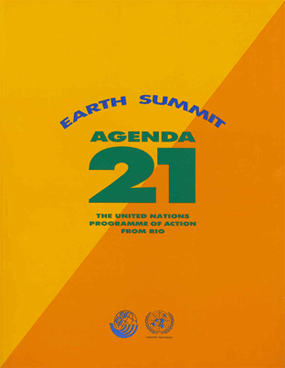What is this Agenda 21 referred to by the anti-sustainability astroturf talking points movie shown at the Georgia statehouse?
The real Agenda 21 is a typical U.N. set of do-good wishful thinking
 documents adopted at a U.N. conference in Rio de Janeiro in 1992.
If you think it’s been successful in actually implementing sustainability,
you haven’t paid attention this summer to the
U.N. Rio+20 successor conference from
activists actually interested in a sustainable economy.
Such pro-sustainability activists generally
bemoaned the lack of effective action in the intervening twenty years:
the climate continues to warm as almost every nation continues to burn
more fossil fuels.
The U.N.’s own Rio+20 document pretty much
relegates such concerns to a sideline to an expanding economy.
documents adopted at a U.N. conference in Rio de Janeiro in 1992.
If you think it’s been successful in actually implementing sustainability,
you haven’t paid attention this summer to the
U.N. Rio+20 successor conference from
activists actually interested in a sustainable economy.
Such pro-sustainability activists generally
bemoaned the lack of effective action in the intervening twenty years:
the climate continues to warm as almost every nation continues to burn
more fossil fuels.
The U.N.’s own Rio+20 document pretty much
relegates such concerns to a sideline to an expanding economy.
The U.N.’s intentions are good: this is a small planet with
 limited resources, and we are busily using them up.
That’s why we need a sustainable economy.
It shouldn’t be all that hard to start one:
stop subsidizing the fossil fuel companies and
get on with renewable energy from the sun and wind and waves and tides.
Companies and countries that go there first will profit first,
as Germany and Denmark and Scotland are already doing.
The rest of us are held back by
the illusion of certainty
in doing what they have always done, even as the planet heats around them.
Why should power utilities and fossil fuel and nuclear companies
do any different as long as they have
limited resources, and we are busily using them up.
That’s why we need a sustainable economy.
It shouldn’t be all that hard to start one:
stop subsidizing the fossil fuel companies and
get on with renewable energy from the sun and wind and waves and tides.
Companies and countries that go there first will profit first,
as Germany and Denmark and Scotland are already doing.
The rest of us are held back by
the illusion of certainty
in doing what they have always done, even as the planet heats around them.
Why should power utilities and fossil fuel and nuclear companies
do any different as long as they have
 financial boondoggles guaranteed for them by regulatory-captured
government agencies,
and abetted by groups like ALEC?
The fossil-nuclear-utility complex
will continue wallowing in the illusion of certainty until
we the people demand something different.
financial boondoggles guaranteed for them by regulatory-captured
government agencies,
and abetted by groups like ALEC?
The fossil-nuclear-utility complex
will continue wallowing in the illusion of certainty until
we the people demand something different.
The people speaking up is
part of governance, a word that gets the conspiracy buffs
bent out of shape.
 Governance is not the same as government.
Government is only a small part of governance,
which includes everything from elected bodies to the media
to people chatting about issues in bars.
The
U.N.’s own definition is:
Governance is not the same as government.
Government is only a small part of governance,
which includes everything from elected bodies to the media
to people chatting about issues in bars.
The
U.N.’s own definition is:
the process of decision-making and the process by which decisions are implemented (or not implemented).
Even floating a conspiracy theory is a part of governance, in that it’s participation by the people. The real Delphi method is a technique of governance, in seeking consensus among people who have input. The anti-sustainability talking points seek to sabotage consensus or even people talking about sustainability because that could lead to the downfall of the fossil fuel utility company gravy stool. The toothless U.N. has no power to impose consensus on the people. It merely seeks, vaguely and mostly ineffectively, to encourage people to get on with what we’re all going to have to do sooner or later, and later it will be much harder.
As for Agenda 21 actually saying any of the stuff conspiracy buffs say it does about doing away with private property rights or being against marriage, I say what I always do: show me. Don’t just handwave at the document; I know where the document is. Show me where in the document it says any of that. Be specific: chapter and verse. Except nobody can do that, because it doesn’t say that.
Next: ALEC and the anti-sustainability talking points.
-jsq
Short Link: